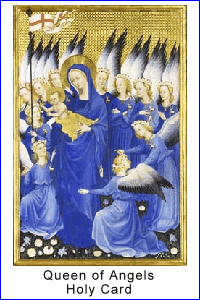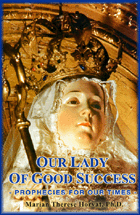Faith under Attack
 |
 |
 |
 |
 |
 |
 |
Errors of Maria Valtorta - 3
Poem of the Man-God:
Dangerous & Unacceptable for Catholics
It would seem that after reading the aberrations in the previous article, no further comment would be needed regarding the merit of The Poem of the Man-God. Still, to open the eyes of readers, we offer a few more examples.
Here we quote what Maria Valtorta says Our Lord himself revealed to her about His temptations to impurity: “Satan was anxious above all to drag me into impurity ... Satan's attempt aimed at this capital point in order to conquer Me” (p. 285).
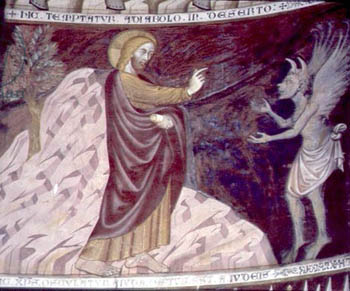 Valtorta adds the temptation to impurity to those temptations that the Gospels tell us Our Lord underwent in the desert. In one conversation with Judas, Valtorta has Our Lord speaking about the supposed sexual temptations He experienced.
Valtorta adds the temptation to impurity to those temptations that the Gospels tell us Our Lord underwent in the desert. In one conversation with Judas, Valtorta has Our Lord speaking about the supposed sexual temptations He experienced.
Judas says to Jesus: “Jesus, have you ever sinned?”
Jesus would have replied: “I never wanted to sin. … I am 30 years old, Judas, and I have not lived in a cave or on some mountain, but among men. And even if I had lived in the loneliest place in the world, do you think temptations would not have come to Me there? ... We all have within us good and evil. We all carry everything within us ...” We note here that Christ is presented as a man, who has within himself the seed of evil coming from Original Sin.
Our Lord supposedly continued, describing the sexual temptations of every man, including himself:
“When you are hungry … the simple thought of being without food will bring back the pleasant smell of food that makes your mouth water. So, the temptation is as strong as that desire, Judas. Satan makes it more intense, more real and more alluring than the accomplished act. Further, the act satisfies and at times nauseates; whereas temptations do not subside, but like pruned trees, they grow stronger and stronger."
“And have you ever yielded?” Judas asks.
“No, never.”
“How did you manage?”
“I said, Father, lead Me not into temptation.”
“What? You, the Messiah Who works miracles, and You ask for help from Your Father."
“Not only for help: I ask Him not to lead Me into temptation."
In this episode, there are three issues to consider, in addition to what has already been said on the impeccability of Christ, which made Him unable to be sexually tempted (see Article 2).
1. Valtorta distorts the Gospel. In none of the Four Gospels do we read about additional temptations other than the ones Our Lord experienced in the desert, let alone any words about sexual temptations.
2. She tries to convince the reader to accept these sexual temptations of Christ by recalling the final words of the Our Father, which Jesus taught to His disciples when they asked Him how they should pray. In it He said to lead us not into temptation, as if the “us” in the petition also included Christ. The Lord's Prayer contains petitions appropriate for men, but not for Christ, who is God and man.
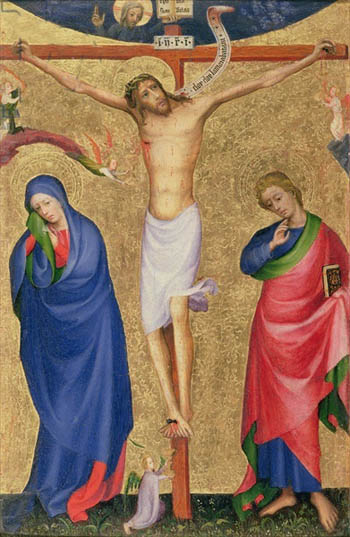 3. Throughout the work of Valtorta one observes a sinuous intent to make Christ appear as a mere man, subject to the miseries of man – including that of the flesh – at the expense of His Divinity. One could say that the work was written by Jews, since the tortuous and even at times sarcastic style is an artifice generally employed by enemies of Christ. Mockery is evident, under the guise of sentimental fantasy and sickly sweetness.
3. Throughout the work of Valtorta one observes a sinuous intent to make Christ appear as a mere man, subject to the miseries of man – including that of the flesh – at the expense of His Divinity. One could say that the work was written by Jews, since the tortuous and even at times sarcastic style is an artifice generally employed by enemies of Christ. Mockery is evident, under the guise of sentimental fantasy and sickly sweetness.
For example, for Christ to call the Blessed Virgin – “mummy” (in the English translation) and “mamacita” in the Spanish – is at the least tasteless and lacking in due reverence. We repeat, it is a kind of mockery of Our Lord and Our Lady.
It seems to us disrespectful to continue transcribing the stories of the temptations of the flesh that Valtorta attributes to Christ and the Blessed Virgin, falsifying the Gospel, as when she pretends Our Lord was tempted by a retinue of scantily clad women, who were told by Annas to lasciviously approach the Lord during His stay in his house during the Passion.
These falsifications of Scripture abound in the Poem, making it a real danger for those ignorant of the Scriptures.
Other aspects of the Poem
In addition to the numerous falsifications of Scripture, Valtorta adds new facts – for example, that the last word of Christ on the Cross was “mummy“ and not what appears in the Gospel – there are doctrinal questions that follow the heretical pattern of Vatican II. They include the following: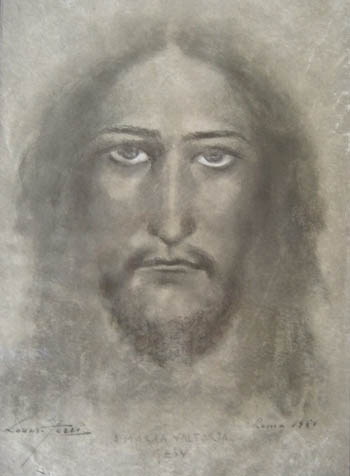 A more comprehensive refutation of the Poem of the Man God – a significant title since it signifies that the life of Christ is imaginative poesy and not history – would call for a large, much heavier to read volume. It is our hope that the Catholic sense of the faithful may be wakened by our short criticism of the perversity of Valtorta's revelations. The purpose of this commentary has been to warn those of good faith, who are enthused by these sentimental accounts of the life of Christ, from falling inadvertently into the trap that constitutes this work.
A more comprehensive refutation of the Poem of the Man God – a significant title since it signifies that the life of Christ is imaginative poesy and not history – would call for a large, much heavier to read volume. It is our hope that the Catholic sense of the faithful may be wakened by our short criticism of the perversity of Valtorta's revelations. The purpose of this commentary has been to warn those of good faith, who are enthused by these sentimental accounts of the life of Christ, from falling inadvertently into the trap that constitutes this work.
Clearly the Poem is a great help for the post-conciliar progressivists. This cannot be denied. It includes their doctrines, theories and heresies and favors religious Judaism, employing many of the same terms as those used by the Vatican II to incline Catholics to “love Israel,” giving them a course on Judaism like what they find in the New Catechism, under the pretext of being true revelations made to Maria Valtorta.
It is said that a priest ordered her to write her autobiography; if it were written and published, it would be interesting to read such a work. We lack much of the data needed to have a complete picture of the motivations of someone who so faithfully foretells the doctrinal guidelines of Vatican II. Obviously, the numerous quotations from the Council cited by commentators on the work in footnotes suffice to demonstrate that the work of Valtorta is a boost to the heresies of Vatican II and the later teachings that emanated from it.
God willing, these pages will open the eyes of those with good faith and eager for spiritual reading, who seek a nourishing food, but will find nothing here, except a deftly spread poison that will break down faith in Jesus Christ, true God and true Man.
Conclusion
After thoroughly examining the work in the light of the dogmatic teaching of the Holy Church, we conclude the following:

Anselmo de la Cruz first published this article
in La Puerta Angosta blog on August 5, 2009
Here we quote what Maria Valtorta says Our Lord himself revealed to her about His temptations to impurity: “Satan was anxious above all to drag me into impurity ... Satan's attempt aimed at this capital point in order to conquer Me” (p. 285).

Valtorta adds sexual temptations during Christ's life to those He suffered in the desert
Judas says to Jesus: “Jesus, have you ever sinned?”
Jesus would have replied: “I never wanted to sin. … I am 30 years old, Judas, and I have not lived in a cave or on some mountain, but among men. And even if I had lived in the loneliest place in the world, do you think temptations would not have come to Me there? ... We all have within us good and evil. We all carry everything within us ...” We note here that Christ is presented as a man, who has within himself the seed of evil coming from Original Sin.
Our Lord supposedly continued, describing the sexual temptations of every man, including himself:
“When you are hungry … the simple thought of being without food will bring back the pleasant smell of food that makes your mouth water. So, the temptation is as strong as that desire, Judas. Satan makes it more intense, more real and more alluring than the accomplished act. Further, the act satisfies and at times nauseates; whereas temptations do not subside, but like pruned trees, they grow stronger and stronger."
“And have you ever yielded?” Judas asks.
“No, never.”
“How did you manage?”
“I said, Father, lead Me not into temptation.”
“What? You, the Messiah Who works miracles, and You ask for help from Your Father."
“Not only for help: I ask Him not to lead Me into temptation."
In this episode, there are three issues to consider, in addition to what has already been said on the impeccability of Christ, which made Him unable to be sexually tempted (see Article 2).
1. Valtorta distorts the Gospel. In none of the Four Gospels do we read about additional temptations other than the ones Our Lord experienced in the desert, let alone any words about sexual temptations.
2. She tries to convince the reader to accept these sexual temptations of Christ by recalling the final words of the Our Father, which Jesus taught to His disciples when they asked Him how they should pray. In it He said to lead us not into temptation, as if the “us” in the petition also included Christ. The Lord's Prayer contains petitions appropriate for men, but not for Christ, who is God and man.

Christ’s last word, according to Valtorta, was ‘Mummy’
For example, for Christ to call the Blessed Virgin – “mummy” (in the English translation) and “mamacita” in the Spanish – is at the least tasteless and lacking in due reverence. We repeat, it is a kind of mockery of Our Lord and Our Lady.
It seems to us disrespectful to continue transcribing the stories of the temptations of the flesh that Valtorta attributes to Christ and the Blessed Virgin, falsifying the Gospel, as when she pretends Our Lord was tempted by a retinue of scantily clad women, who were told by Annas to lasciviously approach the Lord during His stay in his house during the Passion.
These falsifications of Scripture abound in the Poem, making it a real danger for those ignorant of the Scriptures.
Other aspects of the Poem
In addition to the numerous falsifications of Scripture, Valtorta adds new facts – for example, that the last word of Christ on the Cross was “mummy“ and not what appears in the Gospel – there are doctrinal questions that follow the heretical pattern of Vatican II. They include the following:
- Misconceptions about the nature of the priesthood;
- Errors regarding the words of Consecration that Valtorta puts in the lips of Christ, different from the formulae dogmatically pronounced by the Holy Church for the realization of this Sacrament;
- Falsehoods about the doctrine of salvation and sanctification, because she asserts that Our Lord revealed to her that “the Commandments alone suffice to sanctify.” This opposes the doctrine that a man must belong to the Catholic Church in order to be saved, and she pretends that the gifts of the Holy Spirit that produce holiness can be given outside of the Church;
- Errors on the nature of the Church, with the claim that Christ told her that everyone is part of the same people of God, both believers and non-believers. This notion of “people of God” is the doctrine of Vatican II, as we know, made to favor the Jews in particular and the Masonic theory of the equality of religions.

A sketch of an occult and whining Christ by artist Lorenzo Ferri, who was directed by Valtorta
Clearly the Poem is a great help for the post-conciliar progressivists. This cannot be denied. It includes their doctrines, theories and heresies and favors religious Judaism, employing many of the same terms as those used by the Vatican II to incline Catholics to “love Israel,” giving them a course on Judaism like what they find in the New Catechism, under the pretext of being true revelations made to Maria Valtorta.
It is said that a priest ordered her to write her autobiography; if it were written and published, it would be interesting to read such a work. We lack much of the data needed to have a complete picture of the motivations of someone who so faithfully foretells the doctrinal guidelines of Vatican II. Obviously, the numerous quotations from the Council cited by commentators on the work in footnotes suffice to demonstrate that the work of Valtorta is a boost to the heresies of Vatican II and the later teachings that emanated from it.
God willing, these pages will open the eyes of those with good faith and eager for spiritual reading, who seek a nourishing food, but will find nothing here, except a deftly spread poison that will break down faith in Jesus Christ, true God and true Man.
Conclusion
After thoroughly examining the work in the light of the dogmatic teaching of the Holy Church, we conclude the following:
- The work is heretical in key points regarding the dogmatic teaching of the Church; (Article 1)
- It is obscene in its descriptions, which promote heresies, such as its pretension that the Original Sin was the sexual act;
(Article 2)
- It favors the new heresies that came from Vatican II;
- It promotes the thesis favoring Judaism upheld by the post-conciliar progressivists;
- It has the censure of the Church, which placed it on the Index of Forbidden Books in 1959. (Article 1)

Posted November 25, 2015
in La Puerta Angosta blog on August 5, 2009
______________________
______________________




